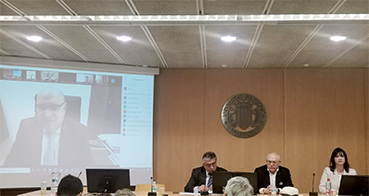The Inter-University Network of Social Economy Research Centres and Institutes (ENUIES), of CIRIEC-Spain, held the Social Economy University Week 2023 from 20 to 30 March. In its fourth edition, the #SemanaUniversitariaES saw a new record number of activities held, 142, in 38 universities, including 5 in Latin America. The number of participants in all the activities is estimated at around 5,000. Once again, this was a great success for the ENUIES Network, whose aim was to raise awareness of the intense university teaching and research activity on the cooperative sector, worker-owned companies, mutual societies, social enterprises and the third sector, and to strengthen ties with representatives of the social economy and their families.
The 4th University Week of the Social Economy concluded with a major event on the new Spanish Law on the University System (LOSU) and the opportunities it provides for the social economy. The event was attended by the Secretary General of Universities (Spanish Government), José Manuel Pingarrón; the president of AECA, Leandro Cañibano; the president of ENUIES, Juan Juliá, and the coordinator, Millán Díaz; the director of CIRIEC-Spain, José Luis Monzón, and the dean of ADE-UPV, Mª del Mar Marín.
All of them celebrated the fact that the new Law recognises the Social Economy as a formula for entrepreneurship that should be promoted by universities, and as a collaborating sector for research activity and knowledge transfer.
Specifically, article 2 of the Law, on the functions of the university system, states in point e) that the functions of the university are to contribute to social welfare, economic progress and the cohesion of society and the territorial environment in which they are located, “through training, research, the transfer and exchange of knowledge and the culture of entrepreneurship, both individual and collective, based on conventional or social economy formulas”.
On the other hand, in Title IV, on Research and the transfer and exchange of knowledge, the law states (article 11.4) that “university research may be carried out jointly with other public bodies or administrations, as well as with public, private and social economy entities and companies”.
Report on University Education in Spain and Directory of Researchers
During the event, Millán Díaz and José Luis Monzón also presented some of the main results of a new report on University Training in the Social Economy in Spain. According to them, a total of around 23,000 hours of formal training in the social economy (bachelor’s, master’s and doctoral degrees) are offered in Spain, which is equivalent to the teaching of more than 100 full-time professors.
For its part, the new CIRIEC-Spain Researchers Directory lists a total of more than 700 university researchers in 21 countries (501 in Spain alone), which gives an idea of the notable interest of the academic world in the social economy.
The event concluded with a round table on ‘University and Social Economy: new opportunities in the face of new legislation’, with the participation of Rafael Chaves, President of the Scientific Commission of CIRIEC-Spain; Raquel Ortega, Director of the Secretariat of Undergraduate Studies at the University of Zaragoza; Carlos Romá-Mateo, Academic Director of Lifelong Learning at the University of Valencia, and Iratxe Amiano, lecturer in the Department of Financial Economics I. at the University of the Basque Country.
New opportunities
All of them agreed that new opportunities are opening up for training and research in the social economy, and for the social economy to participate in the university system in turn, adequately reflecting the diversity of forms of entrepreneurship and creating enterprise, welfare and social cohesion.
The event and the 4th University Week of the Social Economy were brought to a close by the Vice-President of CIRIEC-Spain, Carmen Marcuello; the president of the Confederation of Cooperatives of the Valencia Region and member of the Board of Directors of CEPES, Emili Villaescusa, and the president of the ENUIES Network, Juan Juliá, who congratulated and thanked all the universities, organisations representing the social economy and public administrations for their participation in this Week, as well as for their systematic and daily work to bring the social economy to the university and vice versa, to make known what the university is doing for the social economy.
There is still a long way to go for the social economy to be adequately reflected in the university, but CIRIEC-Spain, through the ENUIES Network, is there to help this path to be travelled more quickly, even more so with the support of legal frameworks such as the recently approved Spanish University System Law.







